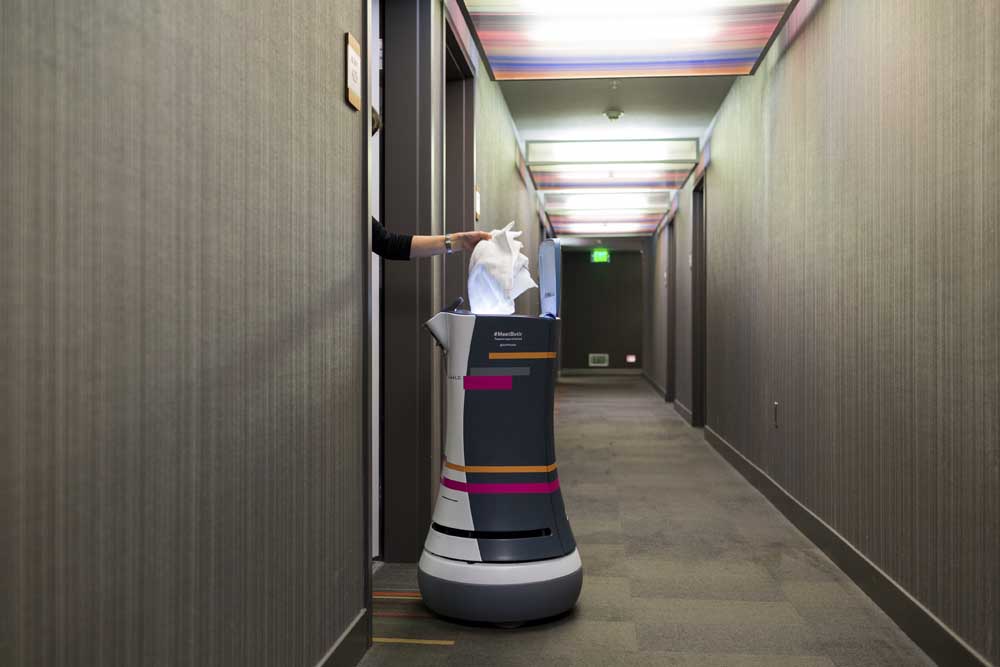Robots are coming for our jobs
Published 12:00 am Tuesday, December 16, 2014

- Jason Henry / The New York TimesThe A.L.O. by Savioke delivers an order of fresh towels to a guest’s room at the Aloft Hotel in Cupertino, California.
A machine that administers sedatives recently began treating patients at a Seattle hospital. At a Silicon Valley hotel, a bellhop robot delivers items to people’s rooms. Last spring, a software algorithm wrote a breaking news article about an earthquake that the Los Angeles Times published.
Although fears that technology will displace jobs are at least as old as the Luddites, there are signs that this time may really be different. The technological breakthroughs of recent years are enabling machines to do knowledge jobs and service jobs, in addition to factory and clerical work.
And during the same 15-year period that digital technology has inserted itself into nearly every aspect of life, the job market has fallen into a long malaise. Even with the economy’s recent improvement, the share of working-age adults who are working is substantially lower than a decade ago — and lower than any point in the 1990s.
Economists long argued that, just as buggy-makers gave way to car factories, technology would create as many jobs as it destroyed. Now many are not so sure.
Lawrence Summers, the former Treasury secretary, recently said that he no longer believed that automation would always create new jobs. “This isn’t some hypothetical future possibility,” he said. “This is something that’s emerging before us right now.”
Erik Brynjolfsson, an economist at MIT, said, “This is the biggest challenge of our society for the next decade.”
Brynjolfsson and other experts believe that society has a chance to meet the challenge in ways that will allow technology to be mostly a positive force. In addition to making some jobs obsolete, new technologies have also long complemented people’s skills and enabled them to be more productive — as the Internet and word processing have for office workers or robotic surgery has for surgeons.
More productive workers, in turn, earn more money and produce goods and services that improve lives.
“It is literally the story of the economic development of the world over the last 200 years,” said Marc Andreessen, a venture capitalist and an inventor of Mosaic, a prototype Web browser. “Just as most of us today have jobs that weren’t even invented 100 years ago, the same will be true 100 years from now.”
Yet there is deep uncertainty about how the pattern will play out now, as two trends are interacting. Artificial intelligence has become vastly more sophisticated in a short time, with machines now able to learn, not just follow, programmed instructions, and to respond to human language and movement.
At the same time, the U.S. workforce has gained skills at a slower rate than in the past — and at a slower rate than in many other countries. Americans ages 55 to 64 are among the most skilled in the world, according to a recent report from the Organization for Economic Cooperation and Development. Younger Americans are closer to average among the residents of rich countries, and below average by some measures.
The challenge is evident for white-collar jobs, too. Ad sales agents and pilots are two jobs that the Bureau of Labor Statistics projects will decline in number over the next decade. Flying a plane is largely automated today and will become more so. And at Google, the biggest seller of online ads, software does much of the selling and placing of search ads, meaning there is much less need for salespeople.
There are certain human skills machines will probably never replicate, like common sense, adaptability and creativity, said David Autor, an economist at MIT. Even jobs that become automated often require human involvement, such as doctors on standby to assist the automated anesthesiologist, called Sedasys.
Some say the nature of work will need to change. Google’s co-founder, Larry Page, recently suggested a four-day workweek, so as technology displaces jobs, more people can find employment. Others believe the role of the public sector should expand, to help those struggling to find work. Many point to education, in new technologies and in the skills that remain uniquely human, like creativity and judgment.
“The answer is surely not to try to stop technical change,” Summers said, “but the answer is not to just suppose that everything’s going to be OK because the magic of the market will assure that’s true.”







